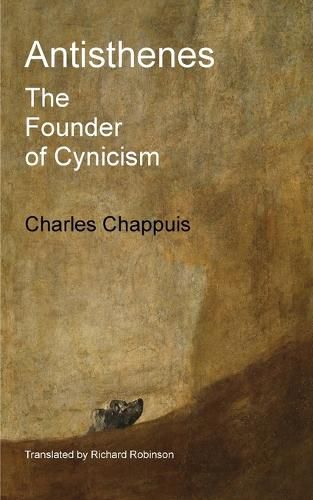Readings Newsletter
Become a Readings Member to make your shopping experience even easier.
Sign in or sign up for free!
You’re not far away from qualifying for FREE standard shipping within Australia
You’ve qualified for FREE standard shipping within Australia
The cart is loading…






This title is printed to order. This book may have been self-published. If so, we cannot guarantee the quality of the content. In the main most books will have gone through the editing process however some may not. We therefore suggest that you be aware of this before ordering this book. If in doubt check either the author or publisher’s details as we are unable to accept any returns unless they are faulty. Please contact us if you have any questions.
Antisthenes: The Founder of Cynicism by Charles Chappuis is a little gem of a book; translated from the French, it puts Antisthenes (444-365 BC), the founder of the Cynic school of Greek philosophy, in his rightful place beside Socrates, his teacher for twenty-four years; beside Plato, a fellow pupil of Socrates and competitor in ideas to Antisthenes: while Plato was teaching at the Academy, Antisthenes, a ????? [illegitimate child], was teaching at the Cynosarges; beside Diogenes, his own pupil and the subsequent head of Cynicism; and so on and so forth, in a long line of esteemed philosophers from Diogenes to Crates to Zeno of Citium, the founder of Stoicism, and later to Epictetus and even to Marcus Aurelius...
The earliest known nominalist in antiquity, Antisthenes developed a logic that "denies rational knowledge and general ideas," "suppresses all definition," and "rejects contradiction and error." He is consequently about as philosophically far from Plato as a philosopher can get. It may not be surprising to know that the two of them became enemies later in life.
As for ethics, Antisthenes "puts wisdom in behavior, virtue in actions, and makes exercise, work, and toil the condition of the good." While "the school of the Cyrenaics conflatesthe good with pleasure, Antisthenes identifies it with virtue, and virtue with effort and toil."
$9.00 standard shipping within Australia
FREE standard shipping within Australia for orders over $100.00
Express & International shipping calculated at checkout
This title is printed to order. This book may have been self-published. If so, we cannot guarantee the quality of the content. In the main most books will have gone through the editing process however some may not. We therefore suggest that you be aware of this before ordering this book. If in doubt check either the author or publisher’s details as we are unable to accept any returns unless they are faulty. Please contact us if you have any questions.
Antisthenes: The Founder of Cynicism by Charles Chappuis is a little gem of a book; translated from the French, it puts Antisthenes (444-365 BC), the founder of the Cynic school of Greek philosophy, in his rightful place beside Socrates, his teacher for twenty-four years; beside Plato, a fellow pupil of Socrates and competitor in ideas to Antisthenes: while Plato was teaching at the Academy, Antisthenes, a ????? [illegitimate child], was teaching at the Cynosarges; beside Diogenes, his own pupil and the subsequent head of Cynicism; and so on and so forth, in a long line of esteemed philosophers from Diogenes to Crates to Zeno of Citium, the founder of Stoicism, and later to Epictetus and even to Marcus Aurelius...
The earliest known nominalist in antiquity, Antisthenes developed a logic that "denies rational knowledge and general ideas," "suppresses all definition," and "rejects contradiction and error." He is consequently about as philosophically far from Plato as a philosopher can get. It may not be surprising to know that the two of them became enemies later in life.
As for ethics, Antisthenes "puts wisdom in behavior, virtue in actions, and makes exercise, work, and toil the condition of the good." While "the school of the Cyrenaics conflatesthe good with pleasure, Antisthenes identifies it with virtue, and virtue with effort and toil."